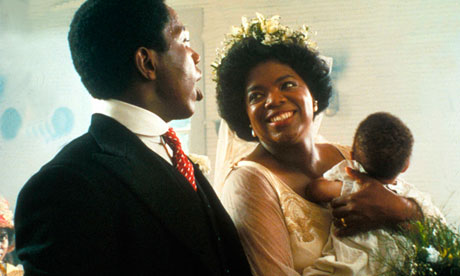As the stage version of The Color Purple arrives in Britain, writer Candace Allen recalls the upset and uproar the novel caused among African Americans

Huge audience … Oprah Winfrey in Steven Spielberg's 1985 film version of The Color Purple. Photograph: Moviestore Collection/Rex Features
The first page took your breath away: a mortified 14-year-old girl has started writing letters to God because she can tell no one else that, although "he never had a kine word to say to me", "he" [her putative daddy] has raped her and warned that she "better … git used to it". Page two, letter two: her mama dead and she "big" with her second baby. He "kilt" the first. "Kill this one, too if he can." Letter three: the letter-writer has a little sister she will protect "with God help". Letter four: sister Nettie has a friend named Mr ___. Letter seven: Mr ___ wants to marry Nettie but he carries a picture of a beautiful, worldly woman named Shug Avery in his wallet. The letter-writer is mesmerised by Shug Avery.
We in turn are mesmerised by the letter-writer's pitiable but profoundly perceptive, truthful voice. "Negro dialect", now called "folk speech": we might not have been ready for it before – thought it ignorant or demeaning, some of us – but we're ready for it now. This voice is clear, simple but not simplistic, allowing us no escape. Letter eight: Mr ___ will marry the letter-writer instead of Nettie, not because he likes her, but because – stupid and ugly as she is – she'll be a good worker. And she finally reveals her name. She is Celie, embarking on a 40-year journey that will take her from bewilderment, through degradation, bestowed and reciprocated love, to self-love and personal agency.
The Color Purple, a simple yet intriguing title, was published in 1982. Alice Walker, the eighth child of southern sharecropping parents, was 38 and already the author of three poetry collections, one volume of essays, two previous novels, and an editor of Ms. Magazine, the women's movement's well-financed and glossy American mouthpiece. In other words, she was not unknown to those of us who cared about the African-American female literary voice. Nor was the novel's terrain an unacknowledged world: a candid exploration of sometimes toxic relationships between black men and black women, the struggle of black women for self-appreciation and personal power. We had read of this in Zora Neale Hurston and Carlene Hatcher Polite, in Gayl Jones and Toni Morrison, heard it sung in countless blues as well as the poetry of Sonia Sanchez and Ntozake Shange to name but a few. But Walker's track record and The Color Purple's singular clarity made the outside (white) literary establishment take notice. In 1983, Walker became the first African-American woman to win both the Pulitzer and National Book awards for fiction, amid all hell breaking loose.
More
We in turn are mesmerised by the letter-writer's pitiable but profoundly perceptive, truthful voice. "Negro dialect", now called "folk speech": we might not have been ready for it before – thought it ignorant or demeaning, some of us – but we're ready for it now. This voice is clear, simple but not simplistic, allowing us no escape. Letter eight: Mr ___ will marry the letter-writer instead of Nettie, not because he likes her, but because – stupid and ugly as she is – she'll be a good worker. And she finally reveals her name. She is Celie, embarking on a 40-year journey that will take her from bewilderment, through degradation, bestowed and reciprocated love, to self-love and personal agency.
The Color Purple, a simple yet intriguing title, was published in 1982. Alice Walker, the eighth child of southern sharecropping parents, was 38 and already the author of three poetry collections, one volume of essays, two previous novels, and an editor of Ms. Magazine, the women's movement's well-financed and glossy American mouthpiece. In other words, she was not unknown to those of us who cared about the African-American female literary voice. Nor was the novel's terrain an unacknowledged world: a candid exploration of sometimes toxic relationships between black men and black women, the struggle of black women for self-appreciation and personal power. We had read of this in Zora Neale Hurston and Carlene Hatcher Polite, in Gayl Jones and Toni Morrison, heard it sung in countless blues as well as the poetry of Sonia Sanchez and Ntozake Shange to name but a few. But Walker's track record and The Color Purple's singular clarity made the outside (white) literary establishment take notice. In 1983, Walker became the first African-American woman to win both the Pulitzer and National Book awards for fiction, amid all hell breaking loose.
More
No comments:
Post a Comment